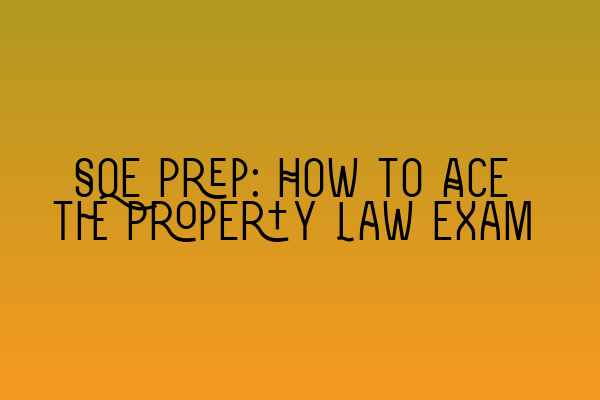SQE Property Law Exam: How to Ace the Property Law Exam
Are you preparing for the SQE Property Law exam and looking for valuable tips to help you succeed? Look no further! In this comprehensive guide, we will provide you with expert advice on how to effectively prepare for and ace the Property Law exam. So, let’s get started!
Understand the Exam Structure
Before diving into the preparation process, it’s essential to familiarize yourself with the exam structure. The SQE Property Law exam consists of multiple-choice questions that assess your understanding of key property law principles and concepts. It also includes scenario-based questions that test your ability to apply these principles in practical situations. It’s important to allocate sufficient time and resources to each component of the exam.
Create a Study Plan
Developing a structured study plan is crucial for effective exam preparation. Start by identifying the key topics and areas that will be covered in the exam. Break down your study plan into manageable sections and allocate specific timeframes for each topic. It’s also essential to set aside regular revision sessions to consolidate your learning and review any areas of weakness.
To enhance your understanding of Property Law, consider using interactive SQE mock tests for Property Law. These tests will allow you to test your knowledge and identify areas that require additional focus.
Interactive SQE Mock Tests for Property Law: Test Your Knowledge
Utilize Comprehensive Study Resources
Having access to reliable study resources is key to exam success. Look for textbooks, study guides, and online resources that cover the required Property Law topics in detail. SQE prep courses tailored specifically to Property Law can also be immensely helpful, providing you with structured content and practice questions.
When studying Property Law, it’s crucial to understand the rights and responsibilities of the parties involved in a contract. For a deeper dive into this topic, check out our article on Parties in a Contract: Rights and Responsibilities.
Focus on Key Concepts
While it’s essential to have a solid grasp of the overall subject matter, it’s equally important to focus on key concepts that are frequently tested in the exam. Understanding the essentials of consideration, for example, will play a significant role in answering scenario-based questions. To further understand the backbone of contracts, take a look at our article on Essentials of Consideration: Understanding the Backbone of Contracts.
Practice, Practice, Practice
Practicing with past exam papers and sample questions is an excellent way to familiarize yourself with the exam format and improve your answering techniques. Set aside regular time for practice sessions and simulate exam-like conditions as much as possible. Additionally, consider taking part in study groups or online forums to discuss challenging questions and gain insights from fellow candidates.
Review and Revise
Regular revision is crucial to reinforce your understanding and memory of key concepts. Set aside dedicated time for revision sessions and create concise notes or flashcards to summarize important points. By regularly reviewing and revising your study materials, you’ll build a solid foundation of knowledge and feel more confident on exam day.
Stay Calm and Confident
As the exam day approaches, it’s important to stay calm and maintain confidence in your abilities. Remember that you have dedicated significant time and effort to your preparation. Stay positive, manage your time effectively during the exam, and trust in your knowledge and skills.
In conclusion, acing the SQE Property Law exam requires thorough preparation, a structured study plan, and consistent practice. By understanding the exam structure, utilizing comprehensive study resources, focusing on key concepts, and practicing diligently, you can increase your chances of success. Stay disciplined, stay focused, and you’ll be well on your way to passing the Property Law exam with flying colors!
If you’re interested in learning about damages in contract law or want to assess financial compensation, check out our article on Damages in Contract Law: Assessing Financial Compensation.
